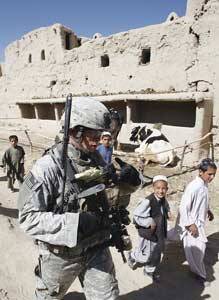Long-term development and humanitarian assistance, protecting civilians and dealing with the root causes of terrorism should be among the guiding principles for the United States as it deals with the complex of problems on the ground in Afghanistan and Pakistan, said the chairman of the U.S. bishops’ Committee on International Justice and Peace. The advice was offered by Bishop Howard J. Hubbard of Albany, N.Y., in an Oct. 6 letter to National Security Adviser and retired Marine Gen. James L. Jones.
Bishop Hubbard acknowledged that U.S. bishops are not military experts, but he wrote that the bishops wanted to offer some principles of Catholic teaching and experience that might help inform policy choices because of the grave implications of the Afghanistan conflict for regional and international security. The Obama administration has been engaged in an exhaustive review of U.S. strategy in the region. “In the face of terrorist threats, we know that our nation must respond to indiscriminate attacks against innocent civilians in ways that combine a resolve to do what is necessary, the restraint to ensure that we act justly and the vision to focus on broader issues of poverty and injustice that are unscrupulously exploited by terrorists in gaining recruits,” Bishop Hubbard wrote.
The bishop directed Jones to the pastoral letter written by the bishops shortly after the 2001 terrorist attacks on the United States, which included criteria for moral discernment and a call to solidarity in the global confrontation with terrorism. As even seasoned U.S. military leaders acknowledge that the success of U.S. operations in Afghanistan cannot come from military measures alone, Bishop Hubbard said guidance from the earlier message was worth revisiting. “In that statement we warned, ‘Probability of success is particularly difficult to measure in dealing with an amorphous, global terrorist network. Therefore, special attention must be given to developing criteria for when it is appropriate to end military action in Afghanistan.’” At the time of the 2001 statement the bishops called for a greater effort to “address the root causes of terrorism rather than relying solely on military means to avoid conflict.”
Hubbard’s letter urges renewed focus on diplomacy in Afghanistan and greater attention to humanitarian assistance and long-term development, particularly agricultural programs. It supports efforts aimed at strengthening local governance and local participation in planning development. Bishop Hubbard cited the church’s experience in Afghanistan through the work of Catholic Relief Services in agriculture, water, income generation, education and health.
“C.R.S.’s ability to develop local partnerships, involving people in examining their needs and determining priorities, has meant that those communities have a greater commitment to their own development, as well as protecting C.R.S. programs and staff,” he wrote. The approach of C.R.S., the U.S. bishops’ overseas relief and development agency, “exemplifies how long-term efforts can lead to sustainable development and contribute to improved security.” The bishops understand the demands of security while carrying out humanitarian aid and development projects, he said. “But too much development assistance appears to be directed to short-term security objectives or channeled through the military,” he noted. “These funds, often used for building projects with little community involvement, are less effective in building stable communities and meeting the legitimate needs of Afghan citizens,” Bishop Hubbard wrote. “Whenever possible, U.S. policy and funding should more clearly delineate and differentiate foreign assistance provided through military channels versus civilian channels.”








